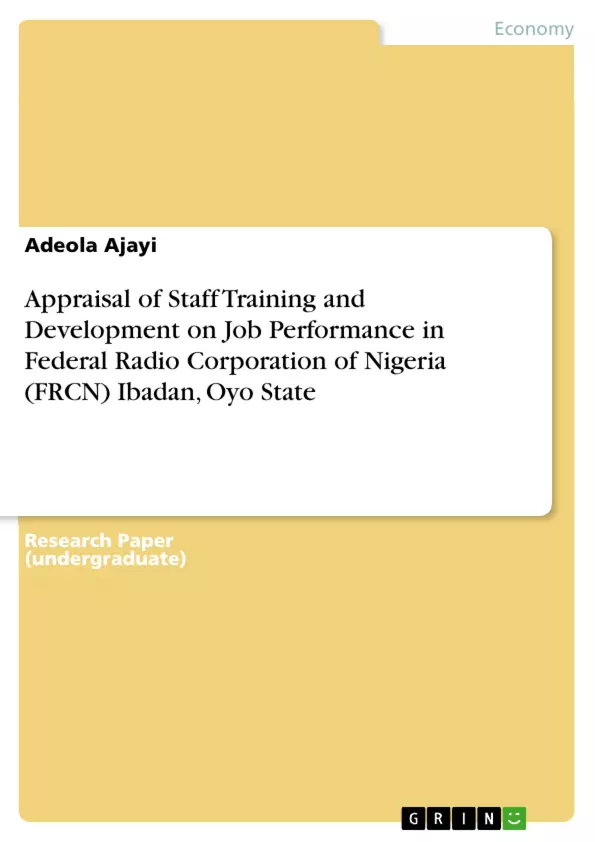The term paper appraised staff training and development on job performance in Federal Radio Corporation of Nigeria (FRCN) Ibadan,Oyo State. It identified the training and development mechanism in FRCN, examined the adequacy of staff training and manpower development in FRCN Ibadan and assessed the effect of training and development on staff performance in FRCN Ibadan.
This was necessitated by the need to ensure quality training and development on job performance in FRCN.
Both primary and secondary sources of data were used. The Primary data are questionnaire and interview method.The sources of data were textbooks, journals, internet sources etc. Purposive sampling was adopted. This is to ensure that the target population FRCN Ibadan have equal chance of being selected and sampled.The term paper revealed that the training and development mechanism that exist in FRCN Ibadan is not an exclusive function of its Director of Administration but other heads of various departments must give consent to it.The paper conclude that scale of salaries of employees should be reviewed as it will improve their job performance, suitable and effective evaluation system should be designed to ensure that there is prompt and effective monitoring of progress by the management and that trainee should be revisted for assessment on how effective the program attended,has enhanced his/her performance.
Table of Contents
- Chapter One: Introduction
- 1.1 Background to the Study
Objectives and Key Themes
The objective of this term paper is to appraise the impact of staff training and development on job performance within the Federal Radio Corporation of Nigeria (FRCN) Ibadan. It aims to identify existing training mechanisms, evaluate their adequacy, and assess the effect of training on staff performance.
- Staff training and development mechanisms within FRCN Ibadan.
- The adequacy of existing training and manpower development programs.
- The impact of training and development on employee job performance.
- The role of employee motivation and retention in successful training programs.
- The importance of training in the context of the mass media industry.
Chapter Summaries
Chapter One: Introduction: This chapter introduces the concept of training and development as a crucial framework for enhancing employee skills and knowledge. It emphasizes the importance of training for employee value, competitiveness, motivation, and retention. The chapter highlights the significant return on investment for employers in terms of increased productivity and loyalty. It also underscores the role of training in reducing dead-end jobs and fostering employee advancement, particularly within the public sector and the unique demands of the mass media industry. The chapter concludes by emphasizing the importance of well-designed orientation programs and the crucial role of training in achieving organizational goals, specifically within the context of FRCN, which operates in the mass media sector responsible for disseminating information, entertainment, and propaganda.
Keywords
Staff training, employee development, job performance, Federal Radio Corporation of Nigeria (FRCN), mass media, employee motivation, retention, productivity, orientation programs, manpower development, public sector.
FAQ: Comprehensive Language Preview - Impact of Staff Training and Development on Job Performance
What is the main objective of this term paper?
The main objective is to evaluate the impact of staff training and development on job performance within the Federal Radio Corporation of Nigeria (FRCN) Ibadan. It aims to identify existing training mechanisms, assess their effectiveness, and determine the effect of training on staff performance.
What are the key themes explored in this paper?
Key themes include staff training and development mechanisms within FRCN Ibadan; the adequacy of existing training programs; the impact of training on employee job performance; the role of employee motivation and retention in successful training programs; and the importance of training in the mass media industry.
What topics are covered in Chapter One?
Chapter One introduces the concept of training and development, emphasizing its importance for enhancing employee skills, competitiveness, motivation, and retention. It highlights the return on investment for employers and the role of training in reducing dead-end jobs and fostering employee advancement, especially within the public sector and mass media. The chapter also stresses the importance of orientation programs and training in achieving organizational goals within FRCN.
What are the key areas of analysis regarding staff training within FRCN Ibadan?
The analysis focuses on existing training mechanisms within FRCN Ibadan, evaluating their effectiveness in improving employee job performance. It also considers the role of employee motivation and retention in the success of these training programs.
What is the significance of this research in the context of the mass media industry?
The research highlights the importance of training within the mass media industry, emphasizing its contribution to employee development, improved job performance, and ultimately, the success of organizations like FRCN in disseminating information, entertainment, and propaganda.
What are the key words associated with this research?
Key words include: Staff training, employee development, job performance, Federal Radio Corporation of Nigeria (FRCN), mass media, employee motivation, retention, productivity, orientation programs, manpower development, and public sector.
What does the document include besides the chapter summaries?
In addition to chapter summaries, the document provides a table of contents, a statement of objectives and key themes, and a list of keywords.
- Arbeit zitieren
- Adeola Ajayi (Autor:in), 2010, Appraisal of Staff Training and Development on Job Performance in Federal Radio Corporation of Nigeria (FRCN) Ibadan, Oyo State, München, GRIN Verlag, https://www.grin.com/document/198262



